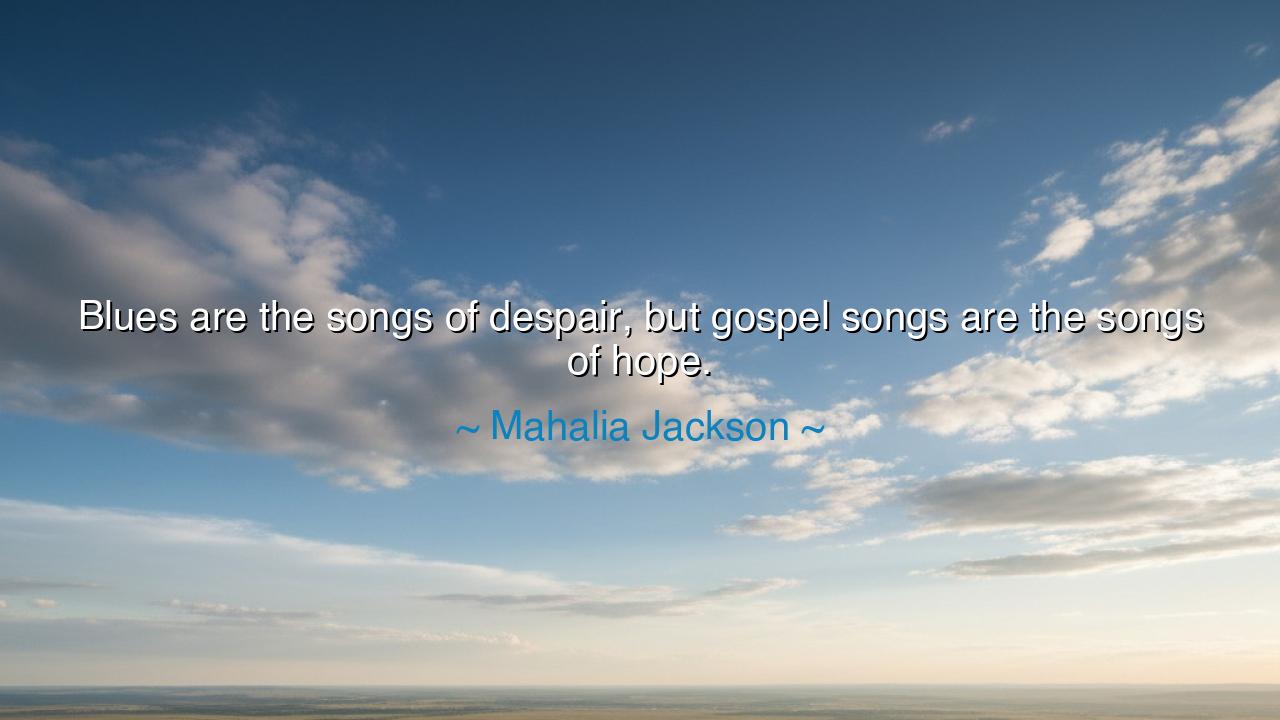
Blues are the songs of despair, but gospel songs are the songs of






“Blues are the songs of despair, but gospel songs are the songs of hope.” — thus spoke Mahalia Jackson, the “Queen of Gospel,” whose voice rose from the sorrow of the oppressed and carried the light of deliverance to all who heard her. In these words lies a truth both ancient and divine: that from the depths of human suffering arise two kinds of songs — one that mourns, and one that believes. The blues, born of pain, give voice to despair; they confess the weariness of the soul under life’s heavy hand. But the gospel, though it springs from the same soil of sorrow, lifts the spirit beyond it. Where the blues cry out, the gospel answers. Where the blues weep for deliverance, the gospel proclaims that deliverance will come.
To understand her meaning, one must understand the origin of these songs. Both were born from the same people — the descendants of slaves, those who had tasted the bitterness of bondage and yet dared to sing. In the fields and shanties of the American South, the blues emerged as a lament — a music of survival. It was the sigh of the laborer after long toil, the confession of loneliness, the quiet cry of the soul that has seen too much and yet endures. It spoke honestly of heartbreak, hunger, and the cruelty of life. The blues was the mirror of the human condition — unflinching, raw, and real.
Yet alongside it rose another voice — the gospel, born of faith and defiance. Where the blues gazed into the valley of shadow, the gospel lifted its eyes to the mountaintop. Its rhythms carried the same grief, but transfigured it with belief — belief in a power greater than pain, in a dawn that would follow the night. As Mahalia Jackson sang, the gospel was not an escape from reality, but a reclamation of it. It said: “We are more than our suffering; we are children of light.” It was the sound of a people refusing to let despair be their only story.
Mahalia herself embodied this truth. Born in New Orleans in 1911, she grew up poor, the daughter of former slaves, her youth marked by hardship and loss. Yet within her was a voice that carried both sorrow and salvation. When she sang the blues, she sang life as it was; when she sang gospel, she sang life as it could be. Her voice became a bridge between earth and heaven, despair and deliverance. She sang not only in churches but also in marches for justice, her voice echoing alongside Dr. Martin Luther King Jr., most famously at the March on Washington. It was she who called out, “Tell them about the dream, Martin!” — urging him to speak those immortal words that gave a nation hope.
Thus, in her music, blues and gospel met not as enemies, but as companions. For despair and hope are not opposites; they are the two wings by which the soul learns to rise. The blues reminds us that we are broken; the gospel reminds us that we can be healed. The blues acknowledges the night; the gospel points toward the morning. Both are necessary, for to deny despair is to deny truth, and to abandon hope is to deny grace. Mahalia understood that a people who have suffered must first speak their sorrow before they can sing their joy — and that through song, the soul remembers its power to overcome.
In the story of her life and her words, there is a lesson for all who live through struggle. Each of us carries both blues and gospel within — the song of pain, and the song of faith. When the world grows dark, it is right to sing the blues, to name our wounds and mourn what is lost. But it is not enough to stop there. We must, like Mahalia, lift our voices in hope — to sing the gospel of renewal, of love that endures, of the light that cannot be extinguished. For the one who learns to turn despair into song transforms suffering into strength, and grief into grace.
So, my child, let this be the lesson: Do not silence your sorrow, but do not dwell in it. Sing your blues with honesty, but let your final note be gospel. Let your pain give birth to compassion, and your hope give birth to courage. For life, like music, is made of tension and release, of shadow and light. When despair threatens to drown you, lift your voice higher — for as Mahalia Jackson teaches, the song of hope is stronger than the song of despair. And when you sing it, even the darkest night must bow before the dawn.
For in the end, hope is not a denial of suffering — it is its redemption. The blues teach us how to endure; the gospel teaches us how to rise. And those who can hold both within their hearts become, like Mahalia herself, living instruments of faith — turning sorrow into symphony, and despair into the music of eternal hope.






AAdministratorAdministrator
Welcome, honored guests. Please leave a comment, we will respond soon